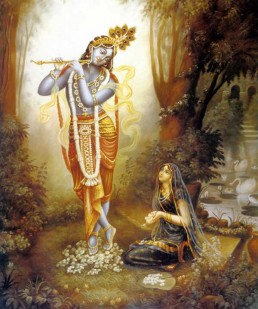Advesta, he who is not hateful; sarva-bhutanam, towards any creature: He does not feel repulsion for anything, even for what may be the cause of sorrow to himself, for he sees all beings as his own Self. Maitrah, he who is friendly-behaving like a friend; karunah eva ca, and compassionate: karuna is kindness, compassion towards sorrow-stricken creatures; one possessing that is karunah, i.e. a monk, who grants safety to all creatures. Nirmamah, he who has no idea of ‘mine’; nirahankarah, who has no idea of egoism; sama-duhkha-sukhah, who is the same under sorrow and happiness, he in whom sorrow and happiness do not arouse any repulsion or attraction; ksami, who is forgiving, who remains unperturbed even when abused or assaulted;/p>p>12.14 Santustah satatam, he who is ever content: who has the sense of contentment irrespective of getting or not getting what is needed for the maintenance of the body; who is similarly ever-satisfied whether he gets or not a good thing. Yogi, who is a yogi, a man of concentrated mind; yata-atma, who has self-control, whose body and organs are under control; drdha-niscayah, who has firm conviction-with regard to the reality of the Self; arpita-mano-buddhih, who has dedicated his mind and intellect; mayi, to Me-(i.e.) a monk whose mind (having hte characteristics of reflection) and intellect (possessed of the faculty of taking decisions) are dedicated to, fixed on, Me alone; sah yah, he who is; such a modbhaktah, devotee of Mine; is priyah, dear; me, to Me. It was hinted in the Seventh Chapter, ‘For I am very much dear to the man of Knowledge, and he too is dear to Me’ (7.17). That is being elaborated here.

